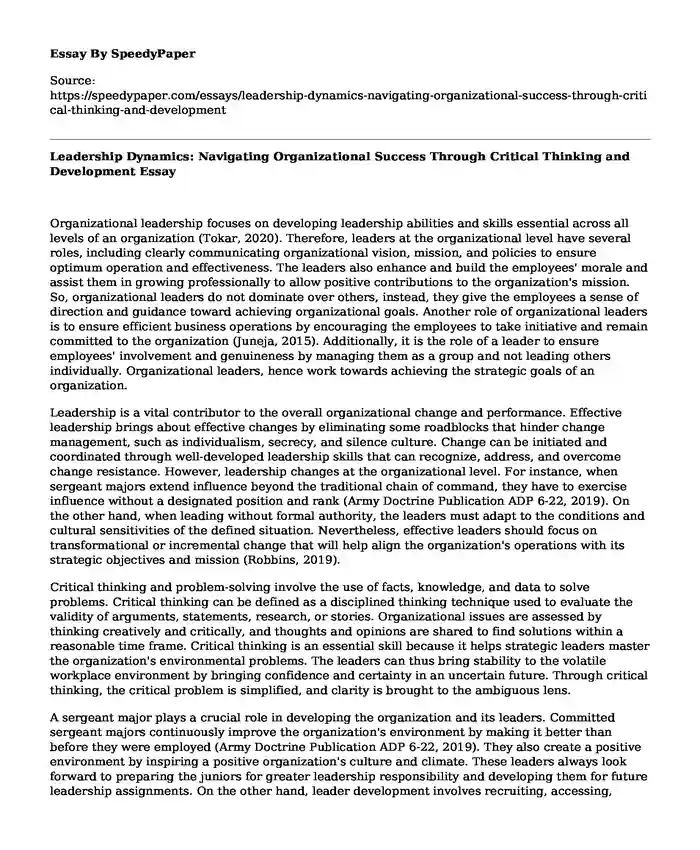
| Type of paper: | Essay |
| Categories: | Leadership analysis Management |
| Pages: | 3 |
| Wordcount: | 609 words |
Organizational leadership focuses on developing leadership abilities and skills essential across all levels of an organization (Tokar, 2020). Therefore, leaders at the organizational level have several roles, including clearly communicating organizational vision, mission, and policies to ensure optimum operation and effectiveness. The leaders also enhance and build the employees' morale and assist them in growing professionally to allow positive contributions to the organization's mission. So, organizational leaders do not dominate over others, instead, they give the employees a sense of direction and guidance toward achieving organizational goals. Another role of organizational leaders is to ensure efficient business operations by encouraging the employees to take initiative and remain committed to the organization (Juneja, 2015). Additionally, it is the role of a leader to ensure employees' involvement and genuineness by managing them as a group and not leading others individually. Organizational leaders, hence work towards achieving the strategic goals of an organization.
Leadership is a vital contributor to the overall organizational change and performance. Effective leadership brings about effective changes by eliminating some roadblocks that hinder change management, such as individualism, secrecy, and silence culture. Change can be initiated and coordinated through well-developed leadership skills that can recognize, address, and overcome change resistance. However, leadership changes at the organizational level. For instance, when sergeant majors extend influence beyond the traditional chain of command, they have to exercise influence without a designated position and rank (Army Doctrine Publication ADP 6-22, 2019). On the other hand, when leading without formal authority, the leaders must adapt to the conditions and cultural sensitivities of the defined situation. Nevertheless, effective leaders should focus on transformational or incremental change that will help align the organization's operations with its strategic objectives and mission (Robbins, 2019).
Critical thinking and problem-solving involve the use of facts, knowledge, and data to solve problems. Critical thinking can be defined as a disciplined thinking technique used to evaluate the validity of arguments, statements, research, or stories. Organizational issues are assessed by thinking creatively and critically, and thoughts and opinions are shared to find solutions within a reasonable time frame. Critical thinking is an essential skill because it helps strategic leaders master the organization's environmental problems. The leaders can thus bring stability to the volatile workplace environment by bringing confidence and certainty in an uncertain future. Through critical thinking, the critical problem is simplified, and clarity is brought to the ambiguous lens.
A sergeant major plays a crucial role in developing the organization and its leaders. Committed sergeant majors continuously improve the organization's environment by making it better than before they were employed (Army Doctrine Publication ADP 6-22, 2019). They also create a positive environment by inspiring a positive organization's culture and climate. These leaders always look forward to preparing the juniors for greater leadership responsibility and developing them for future leadership assignments. On the other hand, leader development involves recruiting, accessing, assigning, developing, promoting, and retaining potential leaders for greater responsibility. In such a situation, the leaders develop their subordinates by preparing them and then challenging them with greater authority, responsibility, and accountability. Sergeant majors also act as stewards of the profession to maintain future professional standards and effective capabilities.
References
Army Doctrine Publication ADP 6-22 Army Leadership and the Profession (2019, July 31). https://www.amazon.com/Army-Doctrine-Publication-Leadership-Profession/dp/1689088931.
Guillot, C. W. M. (2004, June 17). Critical Thinking For The Military Professional. Air & Space Power Chronicles . https://www.airuniversity.af.edu/Portals/10/ASPJ/journals/Chronicles/guillot.pdf.
Juneja, P. (2015, February 13). MSG Management Study Guide. Organizational Leadership. https://www.managementstudyguide.com/organizational-leadership.htm.
Robbins, S. P., & Judge, T. A. (2019). Organizational behavior. Pearson.
Tokar, S. (2020, January 16). What is Organizational Leadership? Southern New Hampshire University. https://www.snhu.edu/about-us/newsroom/2018/07/what-is-organizational-leadership.
Cite this page
Leadership Dynamics: Navigating Organizational Success Through Critical Thinking and Development. (2024, Jan 27). Retrieved from https://speedypaper.com/essays/leadership-dynamics-navigating-organizational-success-through-critical-thinking-and-development
Request Removal
If you are the original author of this essay and no longer wish to have it published on the SpeedyPaper website, please click below to request its removal:
- Paper Example. Lack of Communication and Lack of Proper Training
- Essay Sample on Starbucks' Organizational Setting
- Essay Sample on The Cybersecurity Enhancement Act
- Research Paper on Risk Management of Best Buy
- Risk Factors among Employee Population - Essay Example
- Advanced Logistics: A Reflective Essay in Business Perspectives - Essay Sample
- Crisis Management: Key to Business Sustainability - Essay Sample
Popular categories




